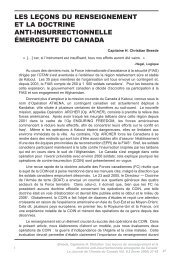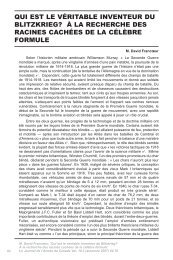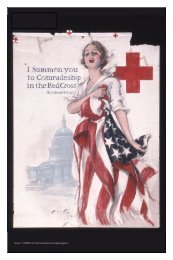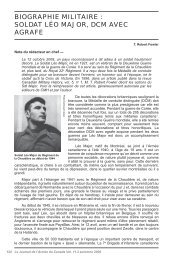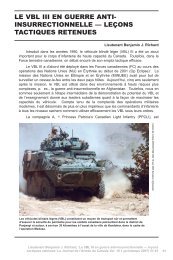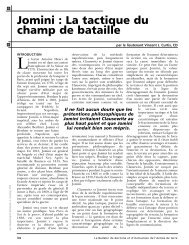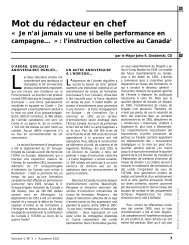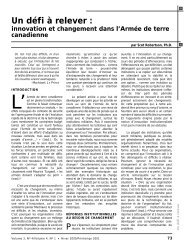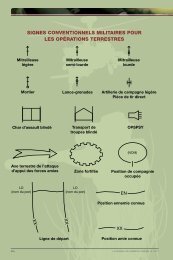The Canadian Army Journal
The Canadian Army Journal
The Canadian Army Journal
You also want an ePaper? Increase the reach of your titles
YUMPU automatically turns print PDFs into web optimized ePapers that Google loves.
144<br />
one of the justifications for the review of this book is that the volume raises questions<br />
and suggests some answers that are directly relevant to <strong>Canadian</strong> involvement in<br />
Afghanistan, Haiti, and the Sudan, three focal points of <strong>Canadian</strong> foreign policy.<br />
<strong>The</strong> book is not without its limitations. Those looking for the highly detailed reference<br />
sections of peer reviewed articles should look elsewhere. Although well referenced for<br />
conference presentations, these essays do not pretend to be more than a point of<br />
departure for understanding the subject. <strong>The</strong> book succeeds in providing a solid<br />
foundation for the reader to understand the broad range of intelligence problems facing<br />
political and military leaders attempting to create long term solutions to often systemic<br />
conflicts. In the end, this volume is recommended to anyone that wants or needs to<br />
develop a firm understanding of the complexity of intelligence collection, analysis and<br />
application problems inherent to most <strong>Canadian</strong> and allied interventions today.<br />
OVERTHROW: AMERICA’S CENTURY OF REGIME CHANGE<br />
FROM HAWAII TO IRAQ<br />
KINZER, Stephen. New York, Times Books, Henry Holt and Company, 2007, 416 pages.<br />
$15.00<br />
Reviewed by Dr. Barbara J. Falk<br />
Immediately after 9/11, it was impolitic if not immoral<br />
to suggest that the history of United States’ (US) foreign<br />
policy had been even marginally responsible for either<br />
the terrorist attacks themselves, or for murderous<br />
regimes of despots such as Iraq’s Saddam Hussein. A<br />
few lone liberals, such as Lewis Lapham and Susan<br />
Sontag argued for a more nuanced view, but were<br />
pilloried for their positions. More than half a decade later<br />
however, the Anglo-American public is more<br />
circumspect—if not jaded—and thus receptive to voices<br />
arguing for a corrective of the long-standing historical<br />
amnesia of the United States.<br />
Among these voices is Stephen Kinzer, a veteran<br />
foreign correspondent for the Boston Globe and <strong>The</strong><br />
New York Times. In Overthrow, he seeks to examine the<br />
much maligned concept of regime change in the longue<br />
durée of US history. He convincingly demonstrates that<br />
armed intervention does not begin with George W. Bush<br />
in Iraq but indeed is as American as apple pie. Woven through the Monroe Doctrine and<br />
manifest destiny is the explicit desire to control or influence the political and economic<br />
behaviour of the Western hemisphere in order to meet American national and<br />
commercial interests. As a journalist, Kinzer knows the value of a compelling narrative<br />
in attracting and holding an attentive reader, and his prose is both energetic and<br />
entertaining. With biographical detail, he brings alive the many swashbuckling<br />
protagonists of his story. From “banana man” and East European emigré Sam<br />
Zemurray’s private efforts to overthrow the government of Honduras along with fellow<br />
soldier-of-fortune mobster “Machine Gun” Molony through to Smedley Bultler who, at the<br />
age of 28 was already a veteran of three US regime change operations, one cannot help<br />
but both abhor and admire the audacious military planning and subterfuge of the many<br />
characters discussed.<br />
<strong>Canadian</strong> <strong>Army</strong> <strong>Journal</strong> Vol. 11.1 Spring 2008


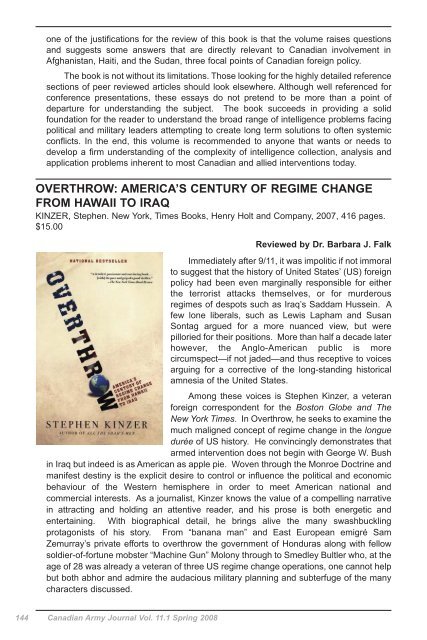
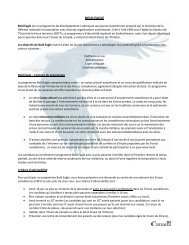
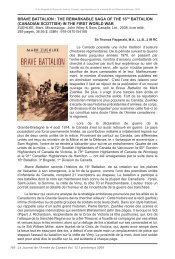
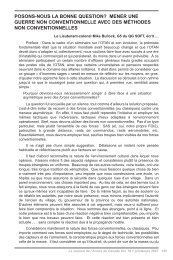
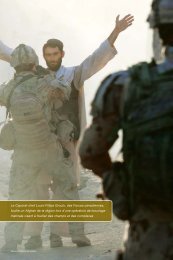
![La modularite dans l'Armee de terre canadienne [pdf 1.6 MB]](https://img.yumpu.com/17197737/1/188x260/la-modularite-dans-larmee-de-terre-canadienne-pdf-16-mb.jpg?quality=85)
